Oct
2022
Recession: How bad will it be?
DIY Investor
7 October 2022



Ben Ritchie, Samantha Brownlee and Rebecca Maclean, investment managers, Dunedin Income Growth Investment Trust
Recession in the UK now looks inevitable. The Bank of England is forecasting that the UK economy will enter recession towards the end of 20221 and continue to shrink throughout 2023. The most important considerations are the extent of the economic decline and its duration. At this stage, it is very difficult to make firm predictions given the number of variables.
However, it is worth noting that a lot of gloom is already priced into equity markets. While this pessimism may be warranted, a number of the factors that are contributing to the weakness of the UK economy could disappear as quickly as they emerged.
‘We are looking at what might go right, as well as what could go wrong.’
High inflation, for example, has been substantially driven by utility price rises, predominantly a result of the conflict in Ukraine and if there were to be some form of resolution, prices could drop quickly. While that looks unlikely today, so did a full-scale war in February.
Another contributory factor towards high levels of inflation has been supply chain disruption, particularly as a result of Covid shut-downs in China. If there were any easing of the zero Covid policy in China, this could also change. Again, the timing is uncertain but it is something that could develop for the positive that markets are not currently pricing.
There are already tentative signs of inflationary pressure starting to ease – freight costs have started to fall, for example, while a lower oil price is sending petrol prices lower. Consumer demand has started to weaken because of the higher cost of living and rising interest rates. While it is undoubtedly a tough situation, we are looking at what might go right, as well as what could go wrong.
Resilient sectors
There is an unholy trinity of potential problem areas for companies in this environment: cyclicality, operational leverage and financial gearing. Where companies have all three of these elements in place, they are likely to be highly vulnerable. Add in thin margins, or exposure to the consumer, and it could be a very difficult road ahead.
Against this backdrop, we are cautious on general retailers exposed to discretionary products and facing significant cost inflation, particularly where the balance sheets are weak. We are also cautious on manufacturing companies with large and powerful customers that are seeing rising input costs.
‘good operating positions with strong balance sheets’
These larger customers will be able to push back on pricing, potentially crushing supplier margins. We are working on the assumption that gas prices will hit the consumer harder than the corporate sector, but that will depend on the support packages put in place.
The companies we seek out for Dunedin Income Growth Investment Trust (DIGIT) have good operating positions with strong balance sheets. Every company is cyclical to some degree, but we try to avoid those companies with a lot of sensitivity to the economic cycle. The gap between resilient companies and those that are more vulnerable is already starting to show in earnings delivery.
Portfolio changes
A key change this month has been in response to the Haleon spin-off from GlaxoSmithKline. Haleon is now a stand-alone consumer health business owning brands such as Advil painkillers, Centrum vitamins and Sensodyne toothpaste. We had originally planned to move all of our holding in GSK’s legacy pharmaceutical business into Haleon. The rump of the business does not pass our quality screens and the consumer pharmaceutical business looked to have a strong pathway of growth.
‘a resilient business with good long-term prospects’
However, when the details were finalised, Haleon emerged with significant debt. We couldn’t get comfortable and ultimately sold out of both companies and reallocated the capital into Unilever.
Unilever will not set pulses racing. However, it is a resilient business with good long-term prospects. We believe it is on the cusp of a turnaround after a period of indifferent operating performance.
Its emerging market exposure, commitment to sustainability and the presence of famed activist Nelson Peltz on the board give us some confidence that better days are ahead. It also offers a very decent dividend which we think has the potential to grow steadily over time and it has now grown to a significant position in the portfolio.
Unusual stocks
One of the key strategic aims of DIGIT is to differentiate ourselves from the market and move away from the benchmark. While we do not seek to be different for the sake of being different, we believe finding interesting and unusual small and mid-cap companies can help enhance the income and capital growth prospects for the trust. As such, we have a range of holdings in companies that may be unfamiliar to investors.
Among these would be Aveva, a rare British technology success story. It is an industrial software business, predominantly used by engineers, particularly those designing major projects such as power stations, oil rigs or ships. More recently it has had some challenges, taking the brave move to shift to a subscription rather than a license model. It is good move for the long-term, but presents some short-term difficulties.
‘finding interesting and unusual small and mid-cap companies can help enhance the income and capital growth prospects for the trust’
While its customers have generally been doing well in the current climate, this has taken some time to feed through into their spending plans. Its share price has also been hit by the wider technology sell-off. However, there is currently a bid from its majority owner Schneider, which has supported the share price.
Chesnara is currently the smallest company in the portfolio. It is an acquirer of closed life books operating in the Netherlands, Sweden and the UK, and the new CEO has shaken the business up and reenergised it. It has a high dividend – currently 7% – and trades at a significant discount to its net asset value. We see opportunity for steady organic growth, complimented with bolt on acquisitions that together could drive attractive and consistent growth.
Assura is a different type of business. It owns primary care facilities in the UK such as GP’s surgeries. We like it precisely because it is dull. It has had a reliable dividend and steady growth. Its end customer (essentially the UK government) is also resilient and we hope it will consistently deliver a high single digit return, of which roughly half will come from dividends. We believe that every portfolio needs an Assura at its core!
We are always on the hunt for something that brings something new to the portfolio in terms of revenue streams. These may be very different businesses, but they have unifying factors – they are good quality companies, with robust business models and the potential for growing dividends.
1 https://www.bankofengland.co.uk/monetary-policy-report/2022/august-2022
Companies selected for illustrative purposes only to demonstrate the investment management style described herein and not as an investment recommendation or indication of future performance.
More information on Dunedin Income Growth Investment Trust PLC here >
Round the World Webinar Series – Ben Ritchie, Dunedin Income Growth
Important information:
Risk factors you should consider prior to investing:
- The value of investments, and the income from them, can go down as well as up and investors may get back less than the amount invested.
- Past performance is not a guide to future results.
- Investment in the Company may not be appropriate for investors who plan to withdraw their money within 5 years.
- The Company may borrow to finance further investment (gearing). The use of gearing is likely to lead to volatility in the Net Asset Value (NAV) meaning that any movement in the value of the company’s assets will result in a magnified movement in the NAV.
- The Company may accumulate investment positions which represent more than normal trading volumes which may make it difficult to realise investments and may lead to volatility in the market price of the Company’s shares.
- The Company may charge expenses to capital which may erode the capital value of the investment.
- Derivatives may be used, subject to restrictions set out for the Company, in order to manage risk and generate income. The market in derivatives can be volatile and there is a higher than average risk of loss.
- There is no guarantee that the market price of the Company’s shares will fully reflect their underlying Net Asset Value.
- As with all stock exchange investments the value of the Company’s shares purchased will immediately fall by the difference between the buying and selling prices, the bid-offer spread. If trading volumes fall, the bid-offer spread can widen.
- Certain trusts may seek to invest in higher yielding securities such as bonds, which are subject to credit risk, market price risk and interest rate risk. Unlike income from a single bond, the level of income from an investment trust is not fixed and may fluctuate.
- Yields are estimated figures and may fluctuate, there are no guarantees that future dividends will match or exceed historic dividends and certain investors may be subject to further tax on dividends.
Other important information:
Issued by Aberdeen Asset Managers Limited, registered in Scotland (No. 108419), 10 Queen’s Terrace, Aberdeen AB10 1XL. Authorised and regulated by the Financial Conduct Authority in the UK. An investment trust should be considered only as part of a balanced portfolio.
Find out more at www.dunedinincomegrowth.co.uk or by registering for updates. You can also follow us on social media: Twitter and LinkedIn.
Brokers Latest » Commentary » Investment trusts Commentary » Investment trusts Latest » Latest » Mutual funds Commentary

Leave a Reply
You must be logged in to post a comment.